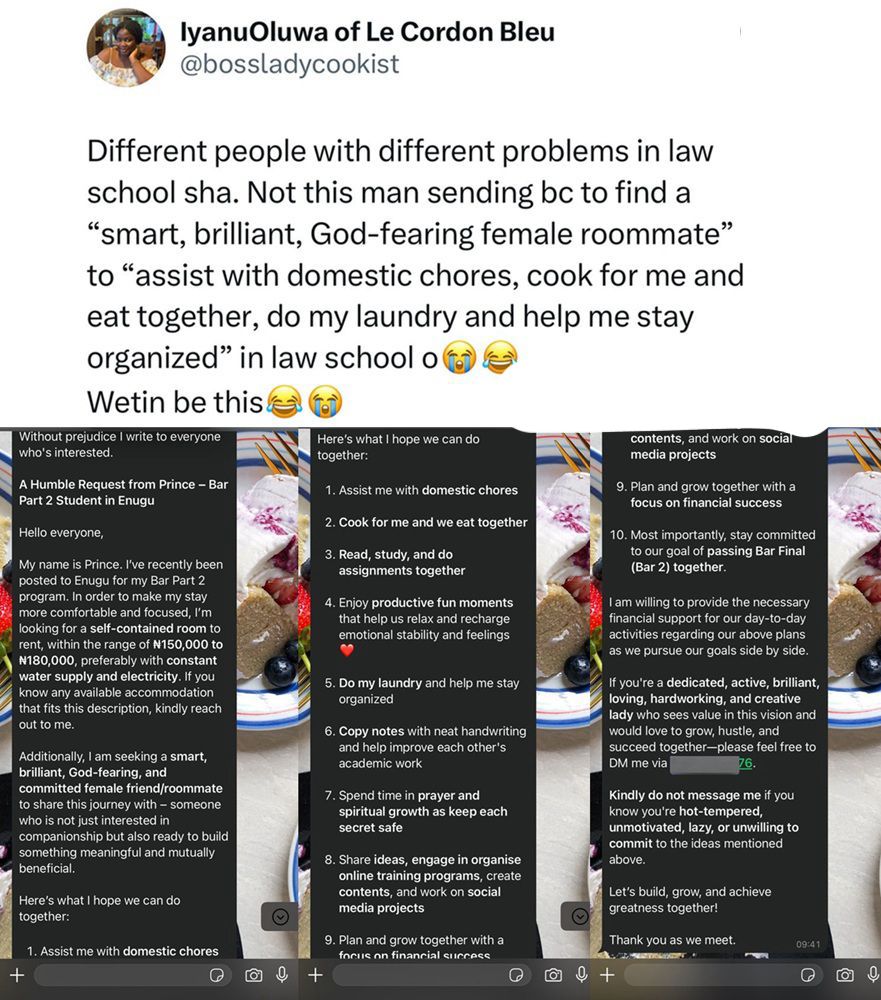
Bar Part 2 Student's 'Roommate Search' Sparks Controversy with Unconventional Request for Domestic Assistance

A student in Enugu has recently caused quite a stir on social media after posting a rather unconventional request for a female roommate to help him with both academic and domestic tasks during his Bar Part 2 program. Prince, who is currently pursuing his legal studies, is looking for a “smart, brilliant, God-fearing” female roommate to not only share accommodation but also assist him with a long list of duties. From cooking meals together to doing his laundry and organizing his schedule, the request has sparked debates on what constitutes reasonable expectations in a shared living situation.
The post, which has since gone viral, outlines Prince's “vision” for a mutually beneficial living arrangement with his prospective roommate. While seeking someone who can help with the more traditional tasks of domestic chores and meal preparation, the post also includes an expectation for academic collaboration, spiritual growth, and even personal projects. Prince emphasized that he is willing to offer financial support for daily activities as they work towards their common goal—passing the Bar Final together.
The specific elements of the request have raised eyebrows. Among the list of duties, Prince asks for a roommate who will cook for him, help with his laundry, assist with academic assignments, take neat notes, and even engage in social media and online training projects. His tone implies a level of commitment and interdependence that some find problematic, questioning whether such an arrangement reflects mutual respect or if it borders on exploitation.
In his message, Prince wrote, "I am looking for a smart, brilliant, God-fearing, and committed female friend/roommate to share this journey with—someone who is not just interested in companionship but also ready to build something meaningful and mutually beneficial." However, as the post continues, it becomes clear that his idea of "mutually beneficial" is centered on a highly transactional and domestic partnership, which has left many scratching their heads about the dynamics of this request.
Critics argue that while sharing a living space with a roommate often requires collaboration on basic chores, the list of expectations Prince outlined seems to place an inordinate amount of responsibility on his future roommate, particularly with tasks traditionally considered domestic. One of the more controversial points is his request for the roommate to "assist with domestic chores" and "cook for me and we eat together," followed by a detailed list of further personal and academic support.
Prince is clear in his post that he is not interested in a "hot-tempered" or "lazy" individual, suggesting a very specific profile for his ideal roommate—one who can not only contribute to the household but also be a driving force in both academic and personal pursuits. His demand for a "God-fearing" woman adds a further layer to his criteria, underlining that his ideal partner for this living arrangement must also share his spiritual values.
One key point of contention among those reacting to the post is the implications of such an arrangement in a world where gender roles and expectations are constantly evolving. Many argue that while roommates may often help one another with basic chores, the expectation of extensive domestic assistance, combined with academic collaboration, suggests a lack of awareness about the burdens such an arrangement could place on the woman involved. Moreover, some have raised concerns that the post might reflect a deeper issue within modern relationships—one that could blur the lines between equality and exploitation.
The social media reactions to the post have been polarized. Some have been quick to dismiss it as an innocuous request for assistance, claiming that it’s simply a student looking for a supportive living arrangement. Others, however, view the post as problematic, accusing Prince of perpetuating outdated gender roles. The request’s tone, which demands that the female roommate meet very specific personal, academic, and domestic standards, has left many feeling uncomfortable.
"This is not the kind of partnership you should expect from a roommate," one commenter noted. "It’s one thing to share responsibilities, but it’s another to put the entire burden of household management on the other person, while expecting them to help with your studies and social projects. This feels more like a business transaction than a roommate relationship."
However, others have defended Prince, saying that his expectations reflect a desire for a balanced and productive living arrangement. They argue that with the right person, this could be an opportunity for mutual growth and success. "If both people are clear on what they want and are willing to commit to it, why not?" one commenter responded. "It’s about finding someone who shares your vision and is ready to work together."
Regardless of the differing opinions, the controversy surrounding this post highlights a larger conversation about living arrangements and relationships in today’s society. In a world where traditional roles are being questioned and redefined, many are beginning to examine the expectations placed on roommates, partners, and friends in shared spaces. The blurred lines between what is considered fair collaboration and what may feel like an imbalance of responsibility are at the heart of this ongoing debate.
For Prince, the search for a roommate who fits this ideal profile has certainly captured attention. Whether or not his specific expectations will be met remains to be seen. However, what is clear is that his post has sparked an important conversation about the nature of relationships in shared living spaces and the importance of setting clear and fair expectations from the start.
In the end, this story serves as a reminder that living together—whether in a friendship, partnership, or a more professional relationship—requires mutual respect, clear communication, and, most importantly, a shared understanding of what each person brings to the table. While Prince's request might be viewed by some as harmless or even ambitious, it also illustrates the fine line between healthy collaboration and potentially harmful dependency. As people continue to navigate the challenges of modern relationships, it will be interesting to see how others interpret and respond to these evolving dynamics.


